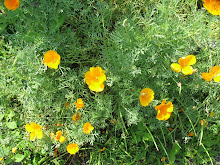There's no way BNAN could have sent bean counters to every plot in the city (though I know some employees would welcome the opportunity to get out of the office). Assumptions were made that equal numbers of the 13 most popular vegetables were grown, and BNAN's Learning Garden in Mattapan was used as a control to obtain yield data over three years, which was then averaged. The monetary value was based on prices for organic produce in the Boston area.
The theory that community gardens raise property values in a neighborhood has also been examined. New York University's Vicki Been and Ioan Voicu reported in a 2006 paper that community gardens in New York City had a positive impact on the values of residential properties within 1000 feet of a garden, particularly in the poorest neighborhoods studied. The value increases can lead to significant increases in tax revenue--an argument that can be used in dealing with city governments who prefer the land to be developed for another purpose.
Anyone interested in the idea of community gardens bringing together a diverse group of people within a neighborhood should check out the results of a survey used by New York state senators who were fighting to preserve New York City community gardens. Although the survey was taken over ten years ago, I can't imagine that the information obtained about the positive uses and impacts of community gardens would be much different today.
To my knowledge, the Minton Stable Garden's impact on the Stoneybrook neighborhood of JP has not been measured, but I know that it's tangible. I have met people in the garden who have expressed a desire to live in the neighborhood just because of it, and many solid friendships have been forged through participation in gardening and other activities.


3 comments:
Sally,
What a fab post! Love how you introduce a way to show "bean" counters the benefits of a community garden in a language they can understand. Thanks.
G.
Great information.
I'm going to forward it to our little group that is working to build enthusiasm in Muskogee OK for community gardens.
Thanks!
Thanks for the positive comments! I'm glad I'm not alone in my enthusiasm for community gardens.
Post a Comment